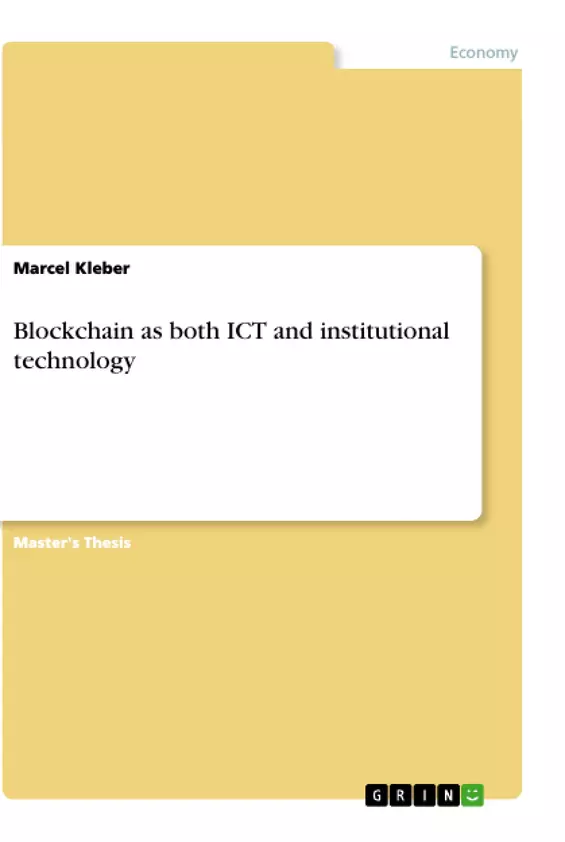This thesis explores and analyses the technical and economic factors that determine the potential of blockchain technology for economy and society and their interactions. At the technical level, blockchain technology is portrayed as a combination of different base technologies. It enables new, potentially disruptive applications by providing an efficient technical solution for the fundamental double-spending problem. Based on these findings, blockchain technology is analyzed regarding a new Techno-economic paradigm. However, this does not (yet) appear to be the case, at least from an isolated perspective. From an institutional economics perspective, blockchain technology proves to be a rule-based system and thus a basis for alternative institutions. On the one hand, these enable new forms of economic interaction and coordination and, on the other hand, these are subject to novel governance mechanisms. It turns out that these decentralized blockchain-based forms can lead to higher efficiency in systems that have been dependent on traditional intermediaries up to now due to lower transaction costs. In contrast, there emerge new intermediaries within the blockchain ecosystem, which reminds of traditional schemes.
Inhaltsverzeichnis (Table of Contents)
- INTRODUCTION.
- BLOCKCHAIN AS ICT.
- BACKGROUND: FROM THE FIFTH TECHNO-ECONOMIC PARADIGM TO BITCOIN
- TECHNICAL ASPECTS OF BLOCKCHAIN.
- BLOCKCHAIN APPLICATION TYPES.
- BLOCKCHAIN AS INSTITUTIONAL TECHNOLOGY.
- BACKGROUND: NEW INSTITUTIONAL ECONOMICS AND GOVERNANCE.
- CRYPTOECONOMICS AND BLOCKCHAIN GOVERNANCE.
- ANALYSES
- USE CASES OF BLOCKCHAIN ON A MACRO LEVEL
- ROLE OF BLOCKCHAIN IN ECONOMY AND SOCIETY.
- IMPACT OF BLOCKCHAIN FROM AN INSTITUTIONAL PERSPECTIVE
- ANALYSIS OF INTERMEDIARIES IN THE BLOCKCHAIN ECOSYSTEM
- CHALLENGES AND RISKS
- CONCLUSION.
Zielsetzung und Themenschwerpunkte (Objectives and Key Themes)
This thesis investigates and analyzes the technical and economic factors that determine the potential of blockchain technology for economy and society and their interactions. It explores the technical aspects of blockchain as a combination of base technologies, assessing its potential for disruptive applications by solving the double-spending problem. It then analyzes whether blockchain technology can be considered a new Techno-economic paradigm. Finally, it examines blockchain's role as a rule-based system and a foundation for alternative institutions, exploring the potential for increased efficiency through reduced transaction costs in systems traditionally reliant on intermediaries.
- Technical aspects of blockchain technology.
- Blockchain applications and their potential for disruption.
- Blockchain's potential as a new Techno-economic paradigm.
- Blockchain's role as a rule-based system and foundation for alternative institutions.
- The impact of blockchain on transaction costs and intermediaries.
Zusammenfassung der Kapitel (Chapter Summaries)
The first chapter provides an introduction to the topic of blockchain technology, outlining the scope and objectives of the thesis. The second chapter explores blockchain technology as a combination of different base technologies. It discusses its technical aspects, including the Byzantine Generals Problem and the concept of a distributed ledger. The chapter also examines different types of blockchain applications. The third chapter examines blockchain technology from an institutional economics perspective. It discusses the emergence of new institutions enabled by blockchain technology and explores the concept of cryptoeconomics and blockchain governance. The fourth chapter analyzes different use cases of blockchain technology on a macro level and explores its potential role in economy and society. It examines the impact of blockchain from an institutional perspective and analyzes the role of intermediaries in the blockchain ecosystem. The chapter also discusses challenges and risks associated with blockchain technology. The fifth chapter, the conclusion, is excluded from this preview to avoid spoilers.
Schlüsselwörter (Keywords)
Blockchain technology, applications, governance, transaction costs, Techno-economic paradigm, intermediaries.
Frequently Asked Questions
Is blockchain technology a new techno-economic paradigm?
According to the analysis, blockchain does not (yet) appear to be a full isolated techno-economic paradigm, although it has significant potential to disrupt traditional economic structures.
How does blockchain solve the double-spending problem?
It provides a decentralized technical solution using a distributed ledger, ensuring that a digital asset cannot be spent more than once without a central authority.
What is "Cryptoeconomics"?
Cryptoeconomics is the study of economic interaction and coordination in decentralized systems, using cryptography and economic incentives to secure the network and manage governance.
How does blockchain impact transaction costs?
Blockchain can lead to higher efficiency by reducing the need for traditional intermediaries, thereby lowering the transaction costs associated with trust and verification.
Are there new intermediaries in the blockchain ecosystem?
Yes, while it aims to decentralize, new intermediaries like crypto-exchanges and wallet providers have emerged, which often mirror traditional financial schemes.
- Arbeit zitieren
- Marcel Kleber (Autor:in), 2019, Blockchain as both ICT and institutional technology, München, GRIN Verlag, https://www.grin.com/document/503066



